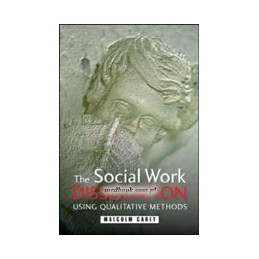- Reduced price

Order to parcel locker

easy pay


 Delivery policy
Delivery policy
Choose Paczkomat Inpost, Orlen Paczka, DHL, DPD or Poczta Polska. Click for more details
 Security policy
Security policy
Pay with a quick bank transfer, payment card or cash on delivery. Click for more details
 Return policy
Return policy
If you are a consumer, you can return the goods within 14 days. Click for more details
Most social work research dissertations use qualitative methodology - sometimes thinly so. Malcolm Careys book answers the numerous questions students repeatedly ask, and in ways which will enrich the doing and teaching of dissertation work at both qualifying and postqualifying levels. It is written accessibly and with numerous helpfully worked examples. Have you read Carey? may soon become a frequently heard question on social work courses. This book will definitely be near the top of my reading lists for dissertation skills courses.
Ian Shaw, Professor of Social Work, University of York
Malcolm Carey is to be congratulated on this book. He has produced an accessible, user friendly, step by step guide to writing a dissertation which is packed with useful examples relevant to social work students. He has accomplished this without over-simplifying the concepts and theoretical perspectives he describes, thus ensuring that the reader can build upon what they have learned. The book will be helpful not only to qualifying the post-qualifying social work students, but to practitioners and managers who wish to undertake a piece of research, but feel a little daunted by the task.
Sue White, Professor of Social Work, Lancaster University, UK
This comprehensive book provides a clear and accessible guide for students undertaking small-scale qualitative research for a social work dissertation. Using jargon free, practical language, the book explains the research process and each of the key stages involved. Also included are::
Acknowledging the limited time and resources typically available to students, the book prioritises small-scale qualitative research. Literature based social work dissertations are discussed alongside key sources of information such as relevant journals and websites.
The Social Work Dissertation offers detailed yet concise explanations and is ideal for social work students at all levels, as well as social work practitioners.
Data sheet
Acknowledgements
Chapter 1:: Social Work Research and the Dissertation
Introduction
How to use this book and structure
The nature of research
The benefits of research for social work students and practitioners
The social work dissertation
Bachelor, Masters and post qualification courses
Research Ethics
Summary
Suggested reading
Chapter 2:: The Research Process for a Social Work Dissertation
Introduction
Select an appropriate topic
Possible topics
Critically review the literature
Create a research proposal
Research committee applications
Choose or construct a research methodology
Apply select method(s)
Analyse data and findings
Write up your data
Disseminate findings
Case examples
Supervision
Summary
Suggested reading
Chapter 3:: Key Concepts in Social Work Research
Introduction
Research concepts
Qualitative research
Applied and pure research
Qualitative data, evidence and triangulation
Research concepts, issues and context
Sampling
Reliability, validity and rigour
Inductive and deductive reasoning
Summary
Suggested reading
Chapter 4:: Theory and Social Work Research
Introduction
Theory and the social work dissertation
Epistemology and social research theory
Positivism and post-positivism
Interpetivism
Critical Theory
Post-Modernism
Recent developments in social work theory and practice
Ontology and ontological approaches
Ontology, epistemology, methodology and method
Summary
Suggested reading
Chapter 5:: The Literature Review and Literature ?Based Dissertations
Introduction
The literature review
Primary and secondary sources
Key sources of secondary information
Keeping records and taking notes
The literature review process and critical analysis
Literature based dissertations
Structure
Summary
Suggested reading
Chapter 6:: Social Work Methodology
Introduction
Social work methodology
Case Study Research
Criticism of Case Study Research
Evaluation research
Feminist methodology
Grounded theory
Critiques of methodology and methodological pluralism
Summary
Suggested reading
Chapter 7:: Traditional Methods:: Interviews, Questionnaires and Focus Groups
Introduction
The interview
Interview formats
Interview questions
Core interview skills:: approach and rapport
Taping or note taking during interviews
Potential problems
Analysis
Interview checklist
Questionnaires
Focus groups
Summary
Suggested reading
Chapter 8:: Alternative Methodology:: Narrative Research, Discourse Analysis and Life History Research
Introduction
Narrative research
Potential problems and criticism of the narrative approach
Discourse analysis
Criticism of discourse analysis
Life history research
Criticism of life history research
Summary
Suggested reading
Chapter 9:: Qualitative Analysis
Introduction
Qualitative analysis
Analysis for a social work dissertation
Analysing documents
Basic thematic analysis
Comparative analysis
Critical analysis
Summary
Further reading
Chapter 10:: Writing Up and Dissemination
Introduction
When to write
Style and critical engagement
Structure
Key sections ? an empirical based dissertation
Key sections ? a literature based dissertation
Possible ways to improve your dissertation
Dissemination
Further reading
References
